A singing nun
In any hypothetical search for the world's most unlikely pop star, the name of Sœur Sourire would almost certainly rank highly on any list. A Dominican nun from Belgium, singing religious songs accompanied only by her own acoustic guitar was nobody's idea of a hit parade hero and yet at the end of 1963, under the anglicised nom de guerre The Singing Nun, she sat squarely atop both the singles and the albums chart in Billboard, the best selling singer in the whole U.S.A. Her rise from the convent to The Ed Sullivan Show was a truly strange story but sadly the aftermath was less happy and the sad tale of her rise and fall is as cautionary a tale about the effects of fame as any.
Born in Belgium in 1933, Jeanne-Paule Marie Deckers was raised in the Catholic faith and worked as a teacher between 1954 and 1959 before deciding to dedicate her life to God, entering a Dominican convent in Waterloo in September 1959, adopting the name Sœur Luc Gabriel. A keen musician, she passed her spare time writing her own religious tunes, which she would perform to her fellow nuns. One her superiors recognised the musical (and religious) worth of her material and suggested that she record an album to be sold to visitors to the convent as a way of raising funds.
In 1962, Sœur Luc Gabriel did exactly that, travelling to Brussels with her guitar and laying down a selection of her songs in the studio. Eight of them made their way onto the finished product, a 25 cm (10") LP that was issued under the name Sœur Sourire (Sister Smile), perhaps to put a little distance between the record and the woman who had recorded it. With cover art by Henri Matisse, the self-titled record was issued by the Philips label and was not only made available for sale at the convent but also went on general sale in both Belgium and France. The eight tracks were fairly genteel - simply picked guitar lines over which the good sister trilled her odes to God, to Jesus and to the founder of the Dominican order. To the faithful, it was a nice change from the traditionally stately religious fare on offer elsewhere, but there was nothing to suggest that tunes like "Tous les chemins" would find anything more than a specialist audience.Nevertheless, somebody at Philips clearly felt otherwise, and the album was also issued in France (and Belgium) spread across two E.P.s (a practice that was then quite common for artists that the label felt might have some commercial potential). The first was helmed by the uplifting "Alléluia", with the thoughtful "Fleur de cactus" opening the disc's second side, while the second kicked off with the catchy "Entre les étoiles". Much to the singer's surprise, the first of these went on to enjoy a significant degree of commercial success in both countries, although it was the second-placed "Dominique", an ode to the founder of the Dominican order, which picked up the airplay that drove the song. This moderate success prompted a release of the album in The Netherlands (as Zuster Glimlach, which is essentially a Dutch translation of Sœur Luc Gabriel's stage name).
Prompted by this unexpected response, the good sister was encouraged by her superiors to make a second recording, which appeared in 1963. A second self-titled set (albums in France and Belgium rarely carried titles at the time), this was again issued on the 25 cm (10") format, with the contents again split over two EPs. Sales this time were less impressive, with neither "Kabinda (Ma petite amie d'Afrique)" nor "Sœur Adèle" finding much favour at radio. Highlights from the two albums were subsequently packaged together on a 30 cm (12") release for the Canadian market and that might, to all intents and purposes, have been that, but for a strange quirk of fate, or timing, or perhaps the will of God...In 1963 America was in the grip of a folk music boom that had been building since The Kingston Trio had topped the charts with "Tom Dooley" in late 1958. The queen of the folk singers, Joan Baez, had exploded into the best selling albums listings in 1961 and by 1963, folk songs by Peter, Paul and Mary, The Rooftop Singers and many others were staking out claims in the upper reaches of the pop singles chart too. Setting aside the language and the religious imagery, there was not a lot to separate Sœur Sourire's music from the records that were setting cash registers ringing from coast to coast, so at some point during 1963, the power that be at Philips decided to greenlight a US release for the album. Rightly recognising that American record buyers might struggle with her French name, the singer was gifted yet another new name (her fourth) and was sent out to market as The Singing Nun. To help the album on its way, the record company also issued her European hit "Dominique" as a single, although as foreign language 45s were as rare in the US charts at this point as Beatles records (the Fab Four, famously, would not hit the Billboard Hot Hundred until 1964), nobody was really expecting more than a minor hit. And yet...
On 8 November 1963, among the new entries to the Hot Hundred, at the surprisingly high placing of # 64, was "Dominique". A week later it was at # 19, the week after that, it shot into the top ten at # 9 and two weeks after that, in the first week of December, it hit # 1, where it wold stay for the rest of the year. The album galloped up the charts after it, also coming to rest at pole position before the year was out, and the world's least likely pop star celebrated Christmas at the top of the charts. In the first week in January, she was in New York for an appearance on The Ed Sullivan Show that took her music and her image into almost every home in the country.
It is hard to understand, today, what it was about Sœur Sourire and "Dominique" that so appealed to American audiences at the time. It has been suggested that her success was down, in part, to the shock and grief of the Kennedy assassination, the type of event that necessarily folds a nation in on itself and sends its citizens seeking comfort in religious faith, but while there may be something in that, the fact is that "Dominique" was already in the top ten well before Lee Harvey Oswald took out his gun. More likely is that the song was picked up by radio (and record buyers) in the run into Thanksgiving (which is, at least in origin, a religious festival) and kept going into the Christmas season - in a sense, it was treated as a Christmas record, albeit one with more religious content than most seasonal hits. Add to that the huge popularity of folk music, and all the pieces were in place for a hit, but even so, the scale of her success - her album sold over two million copies - was still astounding.
Off the back of its surprise American success, "Dominique" made its way around the world, making the top ten in both the UK and Australia, re-charting in both Belgium and France and selling by the bucket load right across South America as dozens of cover versions appeared around the world, in almost as many languages. The General Music Company published a songbook with English-language translations of fifteen of her songs and a second international album Her Joy Her Songs was quickly pulled together by Philips to capitalise on her success. A second US single, "Tous les chemins" appeared in record racks in January and was soon bubbling under the Hot Hundred. Meanwhile the great Ameican singer Frankie Laine put out an English-language cover of "Entre les étoiles" ("Up Among The Stars") as a single in February and MGM began to make noises about making a film based on the singer's life. This eventually appeared in 1966 with Debbie Reynolds in the lead role, but although enjoyable, The Singing Nun had about as close a connection to reality as the average announcement by Donald Trump.Sadly, Sœur Sourire did not enjoy the benefits of her global success. While her records earned considerable royalties for her publisher and her record label, her own share went directly into the convent (as originally intended). Worse, her international fame caused resentment among her fellow nuns, and the difficulty of balancing her recording career with the discipline of the convent eventually forced her to seek a life outside of her religious order, setting up a home with Annie Pécher, a friend from her pre-convent days.
As she was no longer a nun, she was unable to record as either Sœur Sourire or The Singing Nun, so she adopted yet another name and issued a new EP in 1966 as Luc Dominique. The lead track, "Je ne suis pas une vedette" saw her rejecting her stardom, but without the novelty of her status as a nun, few record buyers were interested and the contemporary album Dominicaine was similarly passed over. As the sixties progressed, she underwent a crisis of faith and fell out with the Catholic church over the clergy's attitude to contraception, writing and releasing "La pilule d'or" in praise of the contraceptive pill. Issued in 1967, this was a minor hit in Quebec but caused uproar among the Canadian leaders of the Catholic church, resulting in cancelled concerts and the effective curtailing of her career.
Later in the sixties, she attempted a career relaunch as a singer of children's songs, but this too proved a commercial dead end and she returned to teaching. She returned to religious music in the early seventies, without success, before suffering a breakdown that led to several years of psychotherapy. Then the taxman came calling for payment on her royalties, which led to a further falling out with her old convent and her old record label and left her in severe financial difficulties. In the meantime, her old hit "Dominique" had become something of a ribald joke to French school children, who sniggered repeatedly as the "Dominique-nique-nique" refrain, the verb "niquer" have a rather rude meaning in French (look it up!), but it was all she had so in 1982 she succumbed to financial pressure and having won back the rights to her old stage name, she re-recorded it in a contemporary disco style - even making a video to promote it. The resulting recording was pretty horrible and while it scored a bit of radio and club play, it did not return her to glory.
Ground down by financial and health pressures, in 1985 both Luc Dominique and Annie Pécher committed suicide. They had lived together for twenty years and requested that they be buried together. It was, indeed, a tragic end. A tacky play, The Tragic and Horrible Life of the Singing Nun, loosely based on her life, ran off-Broadway in the nineties but did nothing to revive her artistic reputation. Happily, a more sympathetic film Sœur Sourire made it to market in France and Belgium in 2009, the same year that a triple CD of her religious recordings was compiled by the FGL label, rightly bringing her work back to prominence. Sœur Sourire may be long gone but here achievements - she was the first Belgian to top the US charts and, so far as I know, remains the only performer to have done so while singing in French - deserve to be remembered.

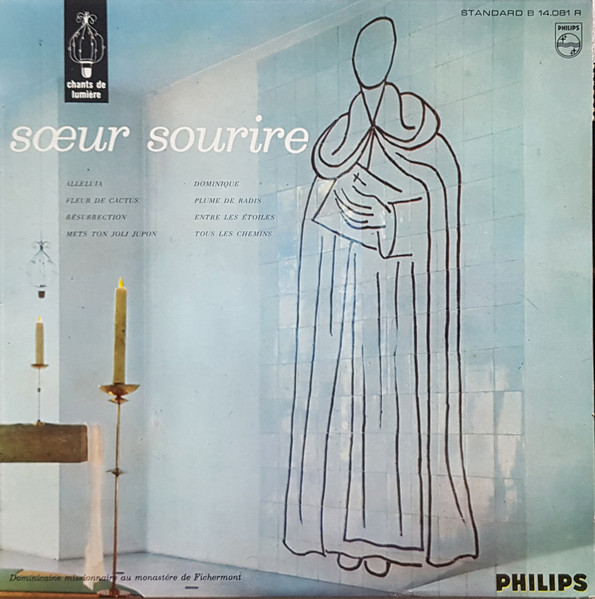
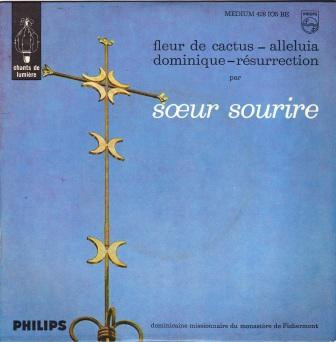


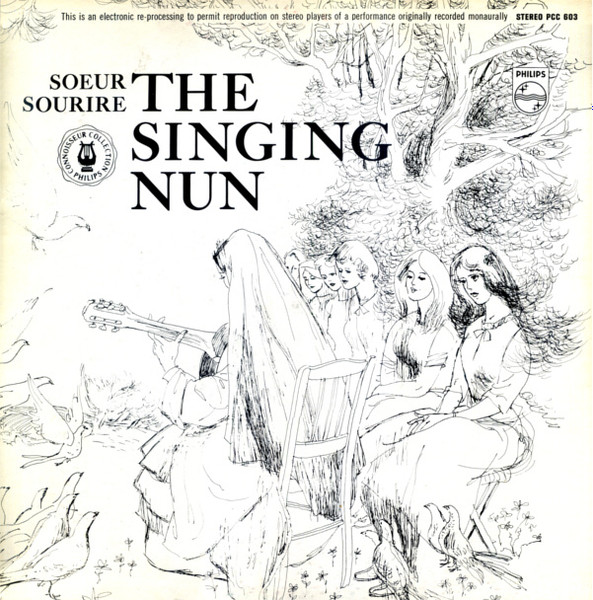
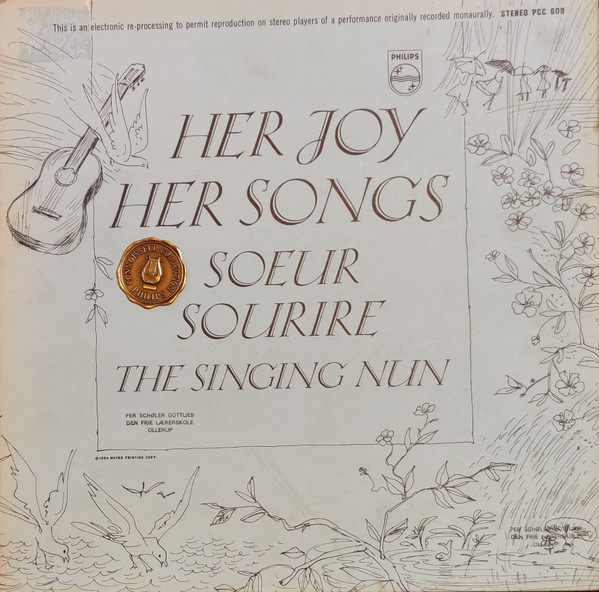
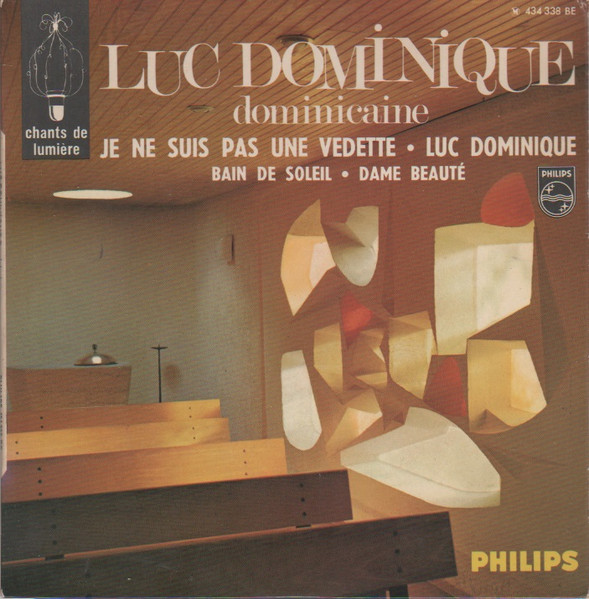
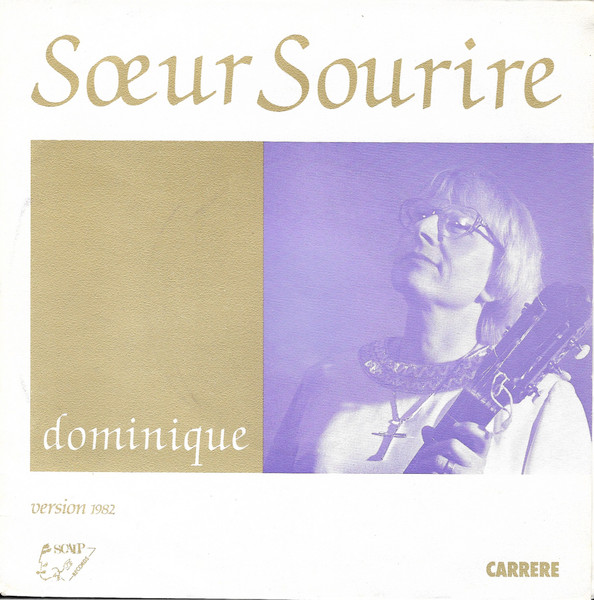
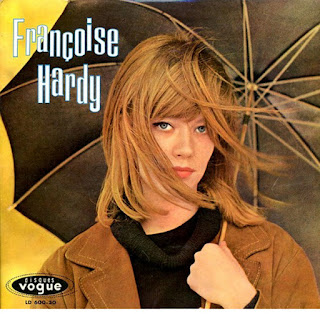
Comments
Post a Comment